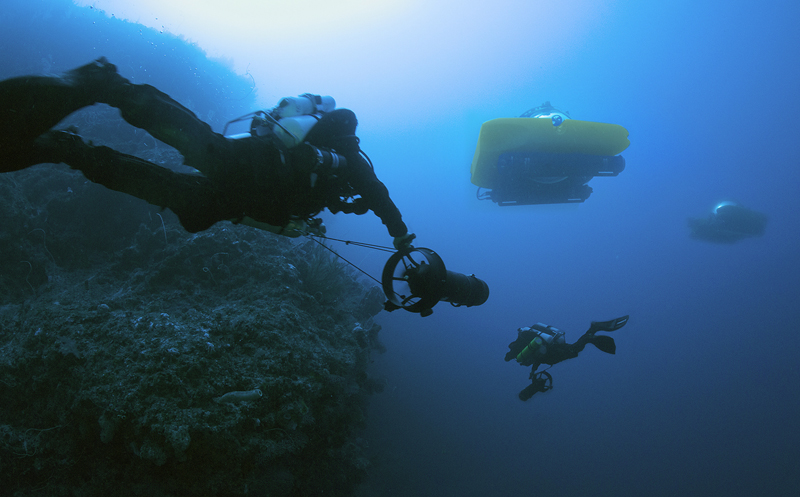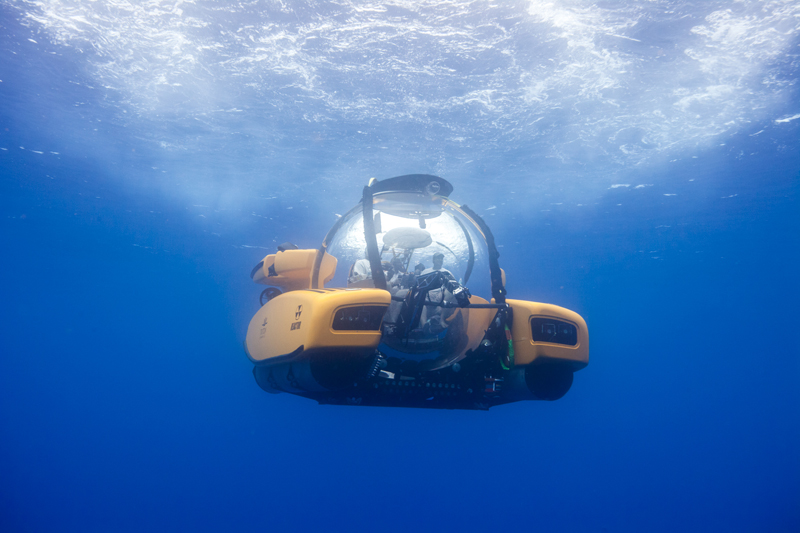Ocean Scientific Research Mission To Launch
Nekton’s first deep ocean scientific research mission — sponsored by re/insurer XL Catlin and partnering with the Bermuda Government’s Ministry of the Environment — is preparing to launch off the coast of Bermuda this week.
To explore the full impact of human activities on the deep ocean, the first in a series of expeditions will use cutting-edge technology including the latest manned submersibles with fully spherical hulls and Virtual Reality 360-degree cameras.
A new set of curriculum resources based on Submarine STEM will be added to XL Catlin’s Oceans Education programme and made freely available.
“The multidisciplinary scientific research programme will create a new standardised methodology to be used by marine biologists for measuring physical, chemical and biological indicators to assess the function, health and resilience of the deep ocean. The scientific findings will be released as part of the XL Catlin Deep Ocean Survey,” a spokesperson said.
“Scientific understanding is at the core of Nekton’s work. The objective is to maximise the global impact of its expeditions to motivate everyone from world leaders to schoolchildren to protect the deep ocean before it’s too late.”
“Climate change, over-fishing, pollution and acidification are causing the ocean to suffer its most extreme disruption for at least 250 million years.
“The evidence of de-oxygenation, warming and acidification in the ocean has led scientists to warn that humans are creating the conditions necessary to produce the planet’s third great mass extinction event.
“Ocean acidity has increased by about 30 per cent since the beginning of the industrial revolution and the occurrence of dead zones [hypoxic, low oxygen areas] has doubled in frequency every 10 years since the 1960s.
“And more than 28 percent of global fish stocks are unsustainably fished and, on the current trajectory, many of the world’s marine species may be on the brink of extinction by 2100.
“The international team will work together from two research vessels, the Baseline Explorer and the Canadian Coast Guard Ship Hudson, and will include scientists from Bermuda Government’s Ministry of the Environment and the Bermuda Institute of Ocean Sciences.
“The Mission is using manned submersibles and remotely operated vehicles [ROVs] to explore the least known part of the planet. Similar to XL Catlin’s previous ocean research programs, there is a real commitment from the all parties involved to make the data freely available for scientists to use.
Alex Rogers, Nekton’s Principal Scientist and Professor of Conservation Biology at the Department of Zoology, University of Oxford, said: “By working together and developing a common scientific approach we will develop a better understanding of ocean health. ‘
“The XL Catlin Deep Ocean Survey will create the first standardised methodology for marine biologists across the world to build on.”
Patrick Tannock, Chief Executive Officer of XL Catlin’s Bermuda Insurance Operations and Chairman of the XL Foundation said: “This partnership is confirmation of our commitment to actively learn more about potential emerging risks. We believe that collecting and sharing reliable and impartial data is imperative.
“As a re/insurance company there is an immediate need to accelerate our knowledge of how the oceans are changing. We need to understand the risks that businesses, society and ecosystems will face in future.”
Oliver Steeds, Nekton’s Mission Director and Founder, said: “The deep ocean is the beating heart of our planet which regulates our atmosphere, water, food and climate.
“Yet we’ve invested only a tiny fraction of the trillions spent on space research on deep ocean research. It’s a race against time to explore and understand this critically important ecosystem before it’s too late.
“Bermuda is the perfect location for our first mission as Nonsuch Island is where deep ocean exploration began. From 1930 to 1934, the island was the base for William Beebe and Otis Barton’s record breaking decent into the ocean using the Bathysphere, a spherical chamber lowered by cable from a ship. They reached a depth of 3028 feet/ 923 meters.” Steeds said.
Chip Cunliffe, Director of Environmental Science Programmes and Education at XL Catlin, said: “The legacy of our ocean science research is for children to understand how important the oceans are to us.
“Using exploration and real science in action, we hope to be able to create a more ocean-literate generation and engage even more around the world than the 3.5m we have done so far.”
Read More About
Category: All, Environment, News





Now this is exciting!